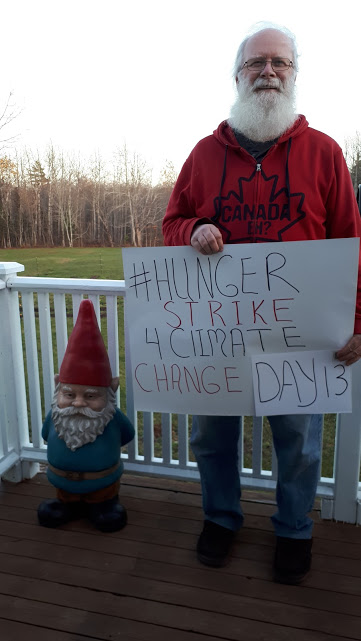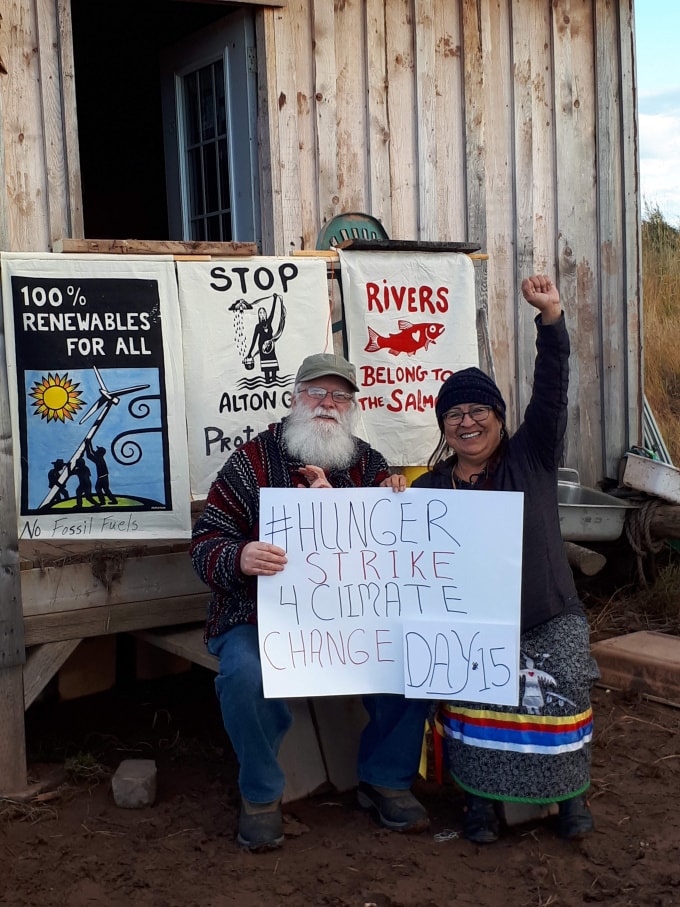
KJIPUKTUK (Halifax) – “They” say that hunger ends after three days and your mind becomes clear during fasts, or in this case, a “hunger strike.”
My experience seems to bear that out, so I hope some of my observations help you connect the climate crisis and its risks to food production. I also hope to stimulate your thoughtful reflection around the question, what should we do with what we know?
When I stopped eating solid foods, subsisting on juice, broth and tea, I also began to research the connection between the climate crisis and risks to our food production. Much of what I learned is on my Facebook page in the news items I posted daily. Here is a concise summation, in 750 words or less, of what I discovered.
I learned that the climate crisis i.e. global rising temperatures are directly impacting food production. Rain cycles are now unpredictable meaning rain comes early keeping farmers off the fields, rains come late ruining crops, rains come furiously/floods or rains do not come i.e. drought. All of these events lead to crop failure, yield reductions or reduce the nutrition in the food we eat.
Crop failures lead to food price spikes, affecting the Global South first and contributing to increased migration as people already experiencing poverty move toward some form of food and personal security.
Rising global temperatures are leading to the expansion of world deserts, the loss of topsoil and the acidification of the oceans, putting at risk the ocean harvest of 17 percent of the world’s protein. Carbon intensive industrial farming is a major contributing factor to unrelenting global warming and readers changing to a locally produced, in season, diet seems to be part of an achievable solution.
I also observed many solutions being considered to mitigate this impending human and planetary disaster. Extinction Rebellion and many of the student climate marchers for instance, are demanding that governments enact effective carbon policies and do so quickly, that media expand their coverage of the climate crisis helping the public connect appropriate news items with the climate crisis at the root of such stories, and that the public should be invited to create solutions by participating in forums like Citizen Assemblies.

As a Nova Scotia participant in the Extinction Rebellion hunger strike and the larger world wide XR hunger strike I heartily agree with these demands. As an individual I am also left to wonder if they will be enough.
Additionally, initiating massive tree planting campaigns and suggested efforts to grow the fertility of soils all seem viable ways to sequester carbon with some producing sources of food for an exploding world population.
Again the question surfaces, will such initiatives be enough to stop, slow down or reverse the climate crisis? In this case having questions does not mean not acting, they simply point to other ramifications of the current predicament we are in.
As I have researched the climate crisis effects on our food sources, I have also had to consider the very real possibility that we have already set in motion climate feedback loops that are unstoppable. Massive methane releases from the Arctic permafrost and the ocean floor are indicators that runaway climate warming is already happening. If climate change is uncontrollable, then how should we respond?
Is it possible that we could build a new way of living in the world, not entirely from the hope of successfully stopping the climate crisis, but by engaging in the challenge of mitigating some of its effects? Can we move to a carbon sequestering green economy, accepting limits on the idea of economic growth? Can we raise to the challenge of mature human living?
It seems to me that the test we must engage includes facing the stark environmental challenges staring back at us, and making the choice to put away the childish pursuit of acquiring yet more stuff or engaging in more diversions.
At the end of my hunger strike I am imagining ways we can actively build human community in a world heavily impacted by the inevitable consequences of climate change. While this perspective is personal and not primarily rooted in the concept of future hope, it has the possibility of creating a liveable world.
There will be an Extinction Rebellion climate crisis hunger strikers discussion this Monday, November 25, 7 pm. at the Grace Jollymore Theatre in Tatamagouche. Check the Facebook event for up to date information.
See also: Paul Jenkinson: Cumberland County’s energy symposium sends the wrong message on fracking
With a special thanks to our generous donors who make publication of the Nova Scotia Advocate possible.
Subscribe to the Nova Scotia Advocate weekly digest and never miss an article again. It’s free!




Paul
Although a personal perspective, your observations and awareness while on your hunger strike, can easily start dialogue of change in our own communities.
Private sector efficient more than governments. Not able to wait for them to catch up. People must start with change in what and how goods are purchased.
I feel food is a 180° starting point for mother earth.
Educating how to eat in season of food production, being satisfied with less variety until the long growing season returns , buying local and organic to insure better stewardship of the soil where food is produced, incorporating more plant based choices, we know(not always acknowledged) that animal agriculture is one of largest contributing factors to green house gases. Watch OMG GMO doc.
Often, lowest price is a deciding factor when purchasing, if one unable to afford higher item produced with greater conscious (but a lower price to the planet) ask, ” do I/we really need”. Food only need be, eat to live .
As in earliest peoples on this land, thinking was more common toward the greatgrandchildren and the world present for them.
Imagine all parents making decisions based on the outcome for their gr gr gr grandchildren vs their own lifespan.
Whether too late or not, an awareness for all present for all times makes for harmonious existence amongst us without the
domineering influence of the state dictating our lives.